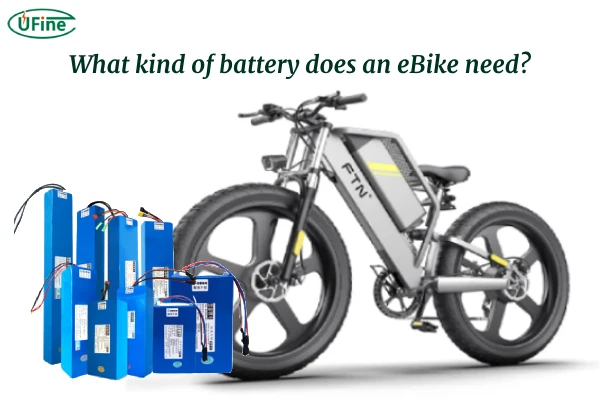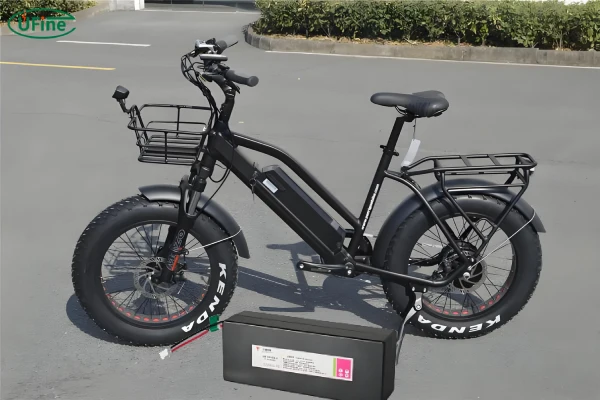If you’re an eBike enthusiast or a new rider who loves the thrill of speed and the convenience of electric power, you might be considering a 72V eBike battery. A 72V battery isn’t just another component; it’s what defines how far and fast you can go. But choosing the right battery can be confusing with so many options on the market. That’s where this guide comes in! We’ll break down everything you need to know about 72V eBike batteries—from the types available to the essential care tips—so you can make the best decision for your ride.
Part 1. What kind of battery does an eBike need?
When it comes to powering an eBike, not just any battery will do. Unlike other types of electric vehicles, eBikes need a battery that’s reliable, portable, and capable of providing steady power to cover long distances. Here are some of the main features eBike batteries require:
-
High Energy Density: eBikes require a lot of energy, especially for long-distance rides or more challenging terrains. Batteries with high energy density, like lithium-ion types, pack more power without adding too much weight.
-
Rechargeability: Since an eBike is designed to be used daily or regularly, it’s crucial that the battery is rechargeable and can handle repeated cycles. This is why lithium-based batteries are popular—they’re known to last for hundreds, even thousands, of charge cycles before performance starts to degrade.
-
Consistent Voltage Output: Your eBike needs a battery that won’t lose power halfway through a ride. A steady voltage output ensures that your bike’s motor has the power it needs for smooth, continuous performance.
-
Temperature and Shock Resistance: Let’s face it: eBikes experience all kinds of weather and road conditions. The battery needs to withstand temperature changes, bumps, and occasional drops. That’s why high-quality eBike batteries are built with durability and safety in mind.
-
Safety Features: A good eBike battery has safety mechanisms to prevent problems like overheating, overcharging, and short-circuiting. This is crucial since these batteries carry a lot of power.
Part 2. Types of 72V eBike batteries
There’s no single “one-size-fits-all” type of battery for eBikes, even if they’re all 72V. The main types are based on the chemical makeup of the battery cells, which influences performance, durability, and cost. Here’s a look at the most common types:
-
Lithium-Ion (Li-ion): The go-to choice for most eBike enthusiasts, lithium-ion batteries are compact, light, and offer excellent energy density. This type of battery charges quickly and can support high power, making it ideal for fast, powerful rides. However, lithium-ion batteries can be sensitive to temperature extremes, and they are on the pricier side.
-
Lithium Iron Phosphate (LiFePO4): Known for their incredible stability, LiFePO4 batteries are safer and often longer-lasting than standard lithium-ion batteries. They don’t store quite as much energy per pound, but they’re more resistant to high temperatures and offer more recharge cycles. These batteries are ideal if you’re looking for peace of mind with an ultra-stable battery.
-
Nickel-Metal Hydride (NiMH): NiMH batteries aren’t as common in eBikes due to their bulk and lower energy density compared to lithium types, but they are more affordable. NiMH batteries can handle a good number of charge cycles, making them a viable option for budget-conscious riders, though they’ll add more weight to the bike.
NiMH vs. Li-ion: 15 Essential Facts Compared
Each of these types has its own advantages, so think about what matters most to you: Do you need the light weight and power of lithium-ion? Or the stability of LiFePO4? Or maybe affordability is your priority with NiMH.
Part 3. Which type of 72V eBike battery is best?
The best type of 72V eBike battery depends on what you’re looking for in a ride. With several battery chemistries to choose from, here’s a breakdown of what each offers so you can decide what’s right for you:
-
For Power and Range: Lithium-ion batteries are your best bet if you want a balance of power, light weight, and fast recharging. They’re a favorite for their high energy density, which gives you more range without adding extra bulk.
-
For Safety and Longevity: LiFePO4 batteries win here. They offer better stability, are less likely to overheat, and can withstand higher temperatures. They also last longer than standard lithium-ion batteries.
-
For a Budget-Friendly Option: NiMH batteries are cheaper, though they’re heavier and less energy-efficient. These might suit a DIY eBike setup or those who aren’t as concerned with maximizing range and speed.
Ultimately, the “best” battery is one that aligns with your riding style, frequency of use, and budget. If you’re a daily commuter, the extra stability of LiFePO4 may be worth it. For thrill-seekers, lithium-ion offers that extra push and lighter weight for easy handling.
Part 4. Are all eBike batteries 72V?
Ebike batteries come in various voltages, and each serves a slightly different purpose. Here’s a rundown of common eBike battery voltages and what they mean for riders:
-
36V Batteries: These are often used for lighter eBikes designed for city commuting. They offer enough power for moderate speeds and distances.
-
48V Batteries: This is the most popular option for many eBikes, balancing power and range for everyday use.
-
52V Batteries: A bit more powerful than 48V, these batteries are great for riders looking for a bit of extra speed and range.
-
72V Batteries: The 72V option is designed for those who want maximum power and range. These batteries are typically found in performance-oriented or off-road eBikes, providing more speed and endurance for longer trips.
Part 5. Weight and sizes
With higher power comes additional weight. A 72V battery is generally larger and heavier than lower-voltage options. Here’s what you can expect:
-
Lithium-Ion 72V Batteries: These batteries tend to weigh between 15-20 pounds, which keeps them light and compact for high-performance use. They’re popular for eBikes that need a balance between power and portability.
-
LiFePO4 72V Batteries: Known for their durability and stability, LiFePO4 batteries are often larger and can weigh a bit more than lithium-ion options, but they provide excellent temperature resistance and a long life.
-
NiMH 72V Batteries: These batteries are typically bulkier and heavier due to their lower energy density. They’re a budget option but can weigh down the bike more, which might affect handling.
Remember to consider your bike’s frame and weight limits when choosing a 72V battery. Larger batteries can impact balance and handling, so a lighter option like lithium-ion may be worth the investment if you’re after a smooth, agile ride.
Part 6. Capacity
Capacity determines how long a battery can power your eBike before needing a recharge, and it’s usually measured in ampere-hours (Ah). For 72V eBikes, common capacities range from 10Ah to 40Ah. Here’s what this means:
- 10Ah: Suitable for shorter trips or casual riders who don’t need a lot of range.
- 20Ah-30Ah: Ideal for moderate rides and commutes, providing a good balance of weight and power.
- 40Ah and Up: Best for long-distance riders or high-performance eBikes; these batteries offer the most extended range but also weigh more.
Part 7. How long does a 72V eBike battery last?
The lifespan of a 72V battery depends on its chemistry and how you care for it. Generally:
- Lithium-ion batteries can last 500-1,000 cycles, translating to about 3-5 years.
- LiFePO4 batteries last even longer, up to 2,000 cycles, which could mean 7-10 years.
- NiMH batteries tend to have shorter lifespans, around 500 cycles, and degrade faster if used heavily.
Proper care, like avoiding full discharges and keeping the battery cool, can help extend its life.
Part 8. What should you pay attention to when buying a 72V eBike battery?
When buying a 72V battery, here are key points to consider:
- Capacity (Ah): Higher capacity equals more range.
- Battery Chemistry: Choose between lithium-ion, LiFePO4, and NiMH based on your needs.
- Weight: Make sure it’s manageable for your bike and riding style.
- Temperature Tolerance: Check the battery’s resistance to extreme temperatures.
- Safety Features: Overcharge and overheat protections are crucial.
- Brand and Warranty: Reputable brands offer better reliability and warranties.
- Compatibility: Confirm that your bike can support a 72V battery.
Part 9. Charging and charger for 72V eBike battery
Charging a 72V eBike battery requires a charger designed specifically for its voltage. Most chargers have safety features like automatic shut-off to prevent overcharging. Here are some charging tips:
- Use a Dedicated Charger: Only use the charger that matches your battery’s specifications.
- Charge at Moderate Temperatures: Extreme cold or heat can reduce efficiency and lifespan.
- Avoid Frequent Full Discharges: Partial charging cycles can actually extend your battery’s life.
Part 10. Maintenance and care
To keep your 72V eBike battery running smoothly, here are some tips:
- Store at Room Temperature: When not in use, keep your battery in a dry, moderate environment.
- Charge Regularly: Avoid letting the battery sit empty for long periods, as this can degrade its cells.
- Inspect Connections: Periodically check battery terminals and connections for signs of corrosion.
With the right 72V eBike battery, you can enjoy powerful rides, long-range capabilities, and reliable performance. Choosing and caring for the right battery can make all the difference in your eBike experience!
Related Tags:
More Articles

How to Choose the Best Floor Scrubber Battery for Commercial Cleaning?
Selecting the ideal floor scrubber battery ensures a long runtime, rapid charging, and minimal maintenance for efficient commercial cleaning operations.
Battery for Blower vs Battery for Leaf Vacuum: Which One Should You Choose?
Battery for blower vs leaf vacuum—learn the key differences in power, fit, and runtime to choose the right battery for your outdoor tool needs.
How to Choose the Right Battery for Blower?
Choosing the right blower battery? Consider voltage, capacity, chemistry & usage. This guide helps match the best battery for peak performance.
How to Choose the Best Insulated Battery Box for Lithium Batteries?
Choosing the Best Insulated Battery Box for Lithium Batteries? Discover key factors such as size, material, and safety for optimal protection and performance.
7 Critical Elements on a Lithium Battery Shipping Label
What must be on a lithium battery shipping label? Learn 7 key elements to ensure safety, legal compliance, and correct handling across all transport modes.





